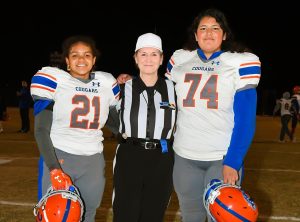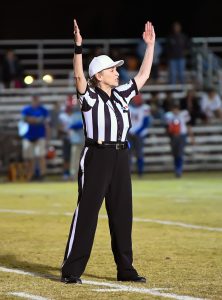- Sports-High School Officiating Shortage, 1,050 words.
- 2 photos available.
By Tyler Bednar
Cronkite News
PHOENIX – Every year, hundreds of Arizona high school football officials come together in one room to discuss the upcoming season. For too many of those years, Anne Montgomery was the only woman in attendance.
Still, Montgomery always wanted to be in that room. She even continued working as a high school official while striving toward her dream as a television anchor, which included a stint as one of the first women to anchor ESPN’s SportsCenter. She also was among the first women to work in the Valley as a sports anchor.
She’s been the lone female voice in a lot of rooms.
Montgomery was an official for 40 years, refereeing games in Arizona for 29 of them before retiring in 2019. She also has authored six novels along the way.
“Over the years, other women have appeared, but for the most part they don’t stick around very long,” Montgomery said of her days as an Arizona Interscholastic Association referee.
Many men don’t, either.
Montgomery’s experiences as a ref exemplified one of the AIA’s biggest challenges: recruiting and retaining officials in all sports.
A quick look through social media sites or on YouTube will explain why. Abuse of officials by parents, coaches and athletes is rampant. Many officials decide it isn’t worth the stress. The result is a growing shortage of high school referees and umpires across the country.
In Arizona over the past few seasons, the AIA has required high school football programs to play a Thursday night football game to compensate for the shortage of refs.
Montgomery is not surprised by the downward trend in one of the most important roles in Arizona high school sports. She believes the constant bombardment officials take is a reason many are leaving the profession.
Ultimately, that will damage high school sports.
“Without the ref, it’s only recess,” Montgomery said. “If people want to continue treating us that way, they’re going to end up going to a field, and there’s not going to be a game. You can’t play without us.”
She believes the solution to the officiating shortage could be recruiting more women into the profession.
“There are so many more girls who play high school sports now that they like sports,” Montgomery said. “Recruit them, teach them, make them feel accepted and you’re going to solve a lot of the problem of not having any officials.”
The officiating shortage is not an Arizona-specific problem. According to the National Federation of State High School Associations (NFHS), the United States lost approximately 50,000 high school officials between the 2018-19 school year and February 2022.
Still, according to the NFHS, more than 3.2 million girls participated in high school athletics during the 2021-22 season – just below the average before the COVID-19 pandemic hit. More than 51,000 girls played a high school sport in Arizona during that season.
Additionally, Arizona has become one of eight states to offer girls high school flag football during the 2023-24 school year. Montgomery believes the new sport provides the AIA a perfect opportunity to find more officials.
“That’s football,” she said of the flag game. “It’s the same idea, so I would go out and recruit some of those young ladies and say, ‘Look, football is a great sport, whether it’s flag or tackle. Would you like to be involved in the game and get paid for it?’”
The high school official shortage has especially affected tackle football. Friday Night Lights has turned into a Thursday Night Showdown for about 15 high school programs each week in Arizona. On Sept. 14, for example, powerhouse Saguaro High School played Shadow Ridge High School in Shadow Ridge’s only Thursday night matchup of the season.
Fourth-year Shadow Ridge coach Sean Hegarty said that, while the schedule is a challenge for a mid-week game, his players needed to roll with the punches.
“It definitely moves things up. It’s a little more difficult at times, but you make do with what you have,” Hegarty said. “The boys have to adapt. Coaches have to adapt.”
Zak Hill is in his first season coaching Saguaro, following two seasons as Arizona State’s offensive coordinator and quarterbacks coach. He understands the difficulty of the AIA’s recent officiating struggles.
“I’ve heard about the referee shortage, and it seems to be a growing concern,” Hill said. “More people don’t want to jump into that world, and it’s a tough world. You’re getting criticized every game. There’s a lot of stress involved and not a lot of compensation.”
Both head coaches praised their players and coaching staff for their ability to maneuver around the difficult circumstances. Saguaro is nearly an hour east of Shadow Ridge, but Hill said his players are emphasizing the “student” first in student-athlete. They are proactive with schoolwork and deal with the grind of being a football player. Hill’s players understand the dedication of being a student-athlete.
Hill said the players in his program understand how difficult officiating can be. Making the referees’ lives as easy as possible is important for Hill, his staff and players.
Matt Kuffel, assistant principal and athletic director at Shadow Ridge, noted that the shortage of officials takes an even greater toll on spring season sports than it does on football.
Kuffel said programs that play numerous times a week are affected more heavily. Sports like baseball and softball experience a domino effect when the AIA is unable to find officials to assign to freshman and junior varsity games.
“If they’re full, now all of a sudden you get a cancellation,” Kuffel said. “Those cancellations will lead into pushing games back. Now all of a sudden you’re not playing two days a week, or three days a week. You’re asking some of your varsity programs to play four days a week.”
And there is another trickle-down effect. Kuffel said game management has become more difficult for the program for a number of events. Some games have been pushed to Saturdays due to the official shortage, and hiring support people to work those games has been a struggle.
Montgomery has been the lone female voice during a majority of her professional sporting career. Whether it be officiating on the field, or describing events to people on the television screen, she has been an ambassador and opened the door for future generations to come.
For more stories from Cronkite News, visit cronkitenews.azpbs.org.

